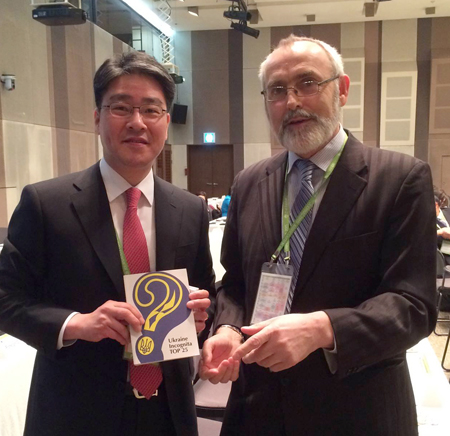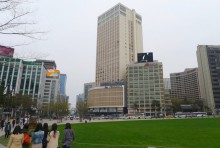As the world’s only split nation, South Korea is making enormous efforts to achieve national reunification. However, its endeavors have so far failed to bring the desired effect, the revival of one nation on the Korean Peninsula. Our readers will know that 70 years ago Korea was split in two. According to Roosevelt and Stalin’s Yalta deal, the north, up to 38th parallel, was controlled by the Soviet troops, south of this line by Americans. Thus, after the end of WWII and Japan’s surrender Korea was freed from the occupation which began back in 1910, and the Korean Peninsula became home to a capitalist and a communist country at the same time. The latter, by the way, launched a war on the former with Stalin’s connivance, and only thanks to the American troops and allies (in particular, from New Zealand) the attack was repulsed. The war lasted from 1950 to 1953 and had a death toll of more than two million. But this did not change the situation. The border line, also known as the Korean Demilitarized Zone, remained where it used to be, in the vicinity of the 38th parallel north. That is why this year South Korea marks two events simultaneously: the 70th anniversary of liberation from the Japanese occupation and the country’s division.
The problem of national reunification is of enormous importance for South Korea, whose President Park Geun-hye, speaking at a New Year’s press conference, compared it with winning a jackpot. The country spares no resources for achieving this goal. Besides involving international players (the US, China, and Russia) for settling this problem and continual attempts to start an inter-Korean dialog, the Republic of Korea uses such a tool as the international journalism conference. On April 13 the World Journalists Conference opened in Seoul. This forum for more than 100 journalists from 60 countries has been held for the third time in Seoul by the Journalists Association of Korea, which unites 10,000 journalists from 200 periodicals. This time the theme is “Peaceful Unification in the Year Marking the 70th Anniversary of the Division of the Korean Peninsula.” The goal of the conference is to create opportunities to discuss the reconciliation and reunification of the divided nation with the participation of international journalists.
The theme of national reunification could be urgent for our country as well, which split after Russia’s illegal annexation of Crimea and aggression in the Donbas. It would be probably useful for Ukrainians to look into South Korea’s know-how, or rather its attempts, at uniting two countries which share the same language and culture. On the other hand, both countries have different political systems: the capitalist one in the south made the Republic of Korea the world’s 12th economy, while North Korea (DPRK) is one of the world’s poorest countries wielding nuclear weapons, which reminds of the Soviet Union in the early 1950s.
South Korean second vice minister of foreign affairs Cho Tae-yul spoke about the foreign political factors and challenges affecting the solution of the national reunification problem in his report titled “Changing Geopolitical Dynamics in Northeast Asia and the Future of the Korean Peninsula.”
According to the vice minister, the main problem is the mutual distrust among players in Northeast Asia. First of all he meant the rise of China’s role, which presents Korea both with a challenge and opportunities. Some experts note that South Korea relies more on China, which is Seoul’s major trade partner, than on the US. This shows the pragmatism of South Korea, which realizes that without Beijing it will never be able to secure any changes in the standpoint of North Korea, totally dependent on the trade with China. Another proof of this pragmatic approach is the fact that Seoul is eager to develop, in Cho Tae-yul’s words, a “prudent and skillful diplomacy” with Russia, since “Russia is Korea’s important partner not only in resolving the North Korean nuclear issue, but also in our pursuit of Trustpolitik and realizing the vision of a reunified Korea.”
During a reception for journalists at a special residence the speaker of the National Assembly of the Republic of Korea Chung Eui-hwa answered the following to The Day’s question why Korea withholds from sanctions against Russia, which has broken all international legal norms by annexing Crimea and continuing its aggression in eastern Ukraine: “We are trying to implement the sanctions, but we have to tread gently with Russia in settling the delicate matter of Korea’s reunification.” Nevertheless, he added that “Korea loves Ukraine.”
Indeed, judging from the English-speaking Korean press, the issue of Seoul-Moscow relations is a complicated one. The editorial in Korean Times of April 14 opines that the president of Korea should do better if she did go to Moscow, where she would have an opportunity to shake hands with the North Korean leader, thus boosting the inter-Korean dialog. Justice must be done to the incumbent leader of Korea, who refused to visit the Victory parade in Moscow.
However, it is still possible that a handshake of South and North Korean leaders could take place at a military parade in Beijing, dedicated to the “70th anniversary of the victory day in armed resistance to Japan’s aggression.” This is exactly how the speaker of the Chinese ministry of foreign affairs dubbed the event. By the way, it would be the first visit of the North Korean leader to Beijing after his ascent to power in 2011.
Speaking of North Korea, Cho Tae-yul noted that despite the nuclear problem and human rights violations in that country, Seoul is making continual efforts to enable a dialog for improving the relations between the two Koreas. He added that, unfortunately, Pyongyang rejects such proposals insisting on preliminary conditions such as the suspension of joint Korean-American exercises.
Despite it all, said the vice minister, the Park Geun-hye government is committed to overcoming the security challenges in Northeast Asia that he mentioned earlier with the vision and strategy envisioned in Korea’s Trustpolitik, and to proactively creating an environment conducive to reunification.
According to him, such efforts will be guided by the following three principles.
Firstly, a balance between peace-keeping and peace-making. On the one hand, it means that the government’s policy will be based on strong deterrence and a firm reaction to North Korea’s provocations, and on the other, on proactive creation of such an environment in which North Korea will have no other choice but to change and faithfully execute small but meaningful trust-building measures.
Secondly, Trustpolitik must focus on improving the quality of people’s life. To this end, South Korea will create infrastructure to improve the livelihood of the North Korean people.
Thirdly, noted Cho Tae-yul, reunification that is in harmony with the interests of neighboring countries, would be blessed by the international community, and contribute to humanity as a whole.

PRESIDENT OF THE JOURNALISTS’ ASSOCIATION OF KOREA WAS PLEASED TO RECEIVE A COPY OF UKRAINE INCOGNITA. TOP 25 AS A GIFT FROM THE DAY
According to a survey by the newspaper The Dong-A Ilbo and the Asan Institute, which was presented by a deputy political editor, only 27 percent believe in the possibility of reunification in 6 to 10 years; 22 percent of respondents believe that it could happen after 11-20 years; meanwhile, the young (20-30 years old) are totally against it. In fact, this issue only interests the older generation, people who still remember their family in North Korea.
It should be mentioned that the term “jackpot” was also used in the speech titled “Trust-Based Diplomacy for Promoting Inter-Korean Talks” made by Na Kyung-won, chairwoman of the National Assembly’s Foreign Relations and Unification Committee. She explained in detail the abovementioned reunification principles and noted that jackpot does not mean a windfall or external assistance, it has to be created by Korea self.
The example of hitherto futile attempts at the reunification of the Korean Peninsula shows that the more actors are engaged in its settlement, the more complex it becomes. The interests of all three participants are absolutely different. It might seem that having a rich South Korea with 50 million inhabitants on the one hand and a poor North Korea with 25 million could simplify the task of reunification. However, it is hindered by China and Russia, which pretend to support the reunification but have done nothing to this end. Besides, there is indeed the question of mutual understanding between people who have spent decades living in different political systems and having different (mostly contrasting) world outlook.
So, the Korean know-how for Ukraine means that, firstly, the solution of domestic issues must never depend on third parties.
Secondly, the settlement of the problem should not be postponed. Everything possible and even impossible must be done to get the Donbas and Crimea back in Ukraine’s political field and avoid letting the country’s reunification turn into a dream or a jackpot, which we can see in the Korean Peninsula.
In The Day’s next issues you will read about transformation of South Korea from a poor country into a Miracle on the Han River, a leading hi tech producer, the world’s 12th strongest economy with a population of 50 million.








